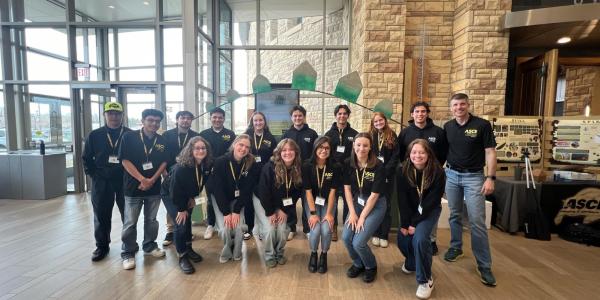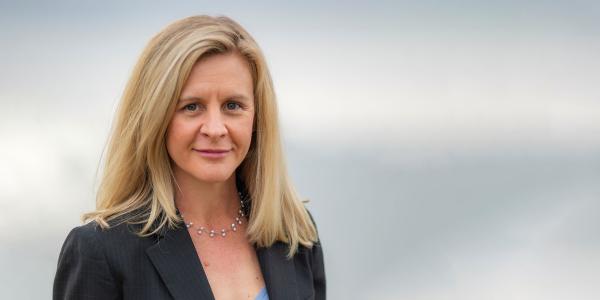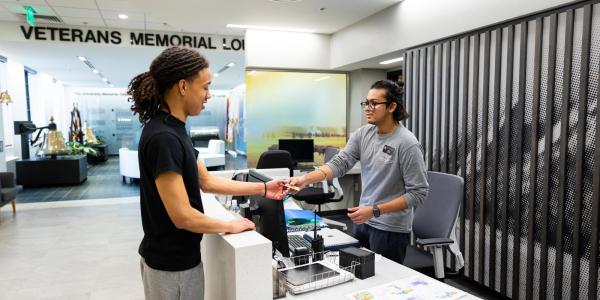Sometimes all a great idea needs is a bit of encouragement.
Recently, Senior Vice Chancellor and CFO Kelly Fox put an experiment in motion. What would happen if she set aside a small budget to fund projects that would encourage creativity in both the work we do and how we do it?
At the end of July, her office issued the first call for Innovation Grants to foster and reward creative solutions to identified challenges, or opportunities that had not yet been addressed. Ideas should be rapidly deployable, small-scale experiments that could lead to later, full-scale implementation.

The Uncommon Collaboration team presents their Innovation Grant proposal
“We have an incredibly talented and dedicated staff at CU Boulder,” Fox said. “I wanted to provide an opportunity for them to test ideas and leverage the insights they’ve gained working across our campus. I am thrilled with the creative and exciting proposals.”
More than 60 proposals were received—all focused on innovative approaches to sustaining the campus community, serving students, and supporting faculty in their teaching and research.Last week, four winners were selected, and four proposals received honorable mention status. An additional set of proposals have been identified as further opportunities for study and mentoring.
“We are so excited for this opportunity. It was something we had been talking about for a while,” said Mary Alford, program coordinator for Campus Building Services, from the team that proposed the Orbio cleaning system.
Their proposal, which will replace nine cleaning products with a single on-site technology, generates a cleaning solution by combining water, electricity and salts. The product is effective, safe and nontoxic.
Jason Marler, floor crew supervisor from Facilities Management, is happy that his crews can make a positive change in their work. “Now we have the support to put a cost-effective and more environmentally friendly solution to the test,” Marler said.
Supporting ideas that have been on the back burner, whether through budget constraints or the fact that they challenge commonly held “myths” in their units, is a positive outcome of the grant project.
“The amount of effort that our teams put in, thinking deeply about their areas and finding collaborative opportunities, is incredibly inspiring,” Fox said.
The winning proposals will receive up to $25,000 to seed-fund the work, and up to $2,500 in bonuses to be shared among the proposal team. The proposals are:
Inaugural Innovation Grant award recipients
Custodial Orbio Technologies OS3 On-Site Generation System
Submitted by Mary Alford, Jason Marler, Hunter DeKieffer, Hector Argueta, Ronie Joe Biggs, Timothy Fairbanks, Kelly Holdren, Olen Howard, Scott Miller, Kevin Murray and Jose Salgado
- The custodial department in Facilities Management has proposed replacing nine cleaning products with a technology that converts water, electricity and salt into two types of cleaning solutions that can be used for all surfaces. The floor crew is testing this solution, and will evaluate the effectiveness and feasibility of the products.
Drone Use to Perform Maintenance Inspections
Submitted by John Steele, Jerry Donnelly, Anthony Miller, Jordan Swallow and Robert Schumaker
- The team proposes the use of a drone for roof, heat trace and building inspections. The technology will allow the team to cost-effectively and safely inspect buildings for damage, heat loss, water penetration and defective gutters, among other uses.
An Uncommon Collaboration to Streamline and Mobilize Research Management
Submitted by Denitta Ward, Christina Tenerowicz, Stephen Vassallo, Raza Dawood, Laura Ragin and Leila McCamey
- The Research Dashboard project recognizes that growing administrative, regulatory and compliance burdens have been placed squarely on the shoulders of researchers. The dashboard will be optimized for both desktop and mobile use and provide researchers with timely, accurate and complete information to manage the administration of research projects, steward sponsor funds and track compliance.
Achievement Scholarship
Submitted by Malerie Barnes, Ofelia Morales, Colleen Newman and Susan Youtz
- The Achievement Scholarship Short Experiment proposes to develop and pilot a scholarship program to incorporate nontraditional forms of achievement and potential for success in the admissions selection criteria.
Four proposals were also recognized with Honorable Mention status, and will receive seed funding.
CU Pathways
Submitted by Vanessa Roman and Julia Villalobos
- CU Pathways will seek to create a pipeline for high school students, following them through their community college experience and guiding them through transferring to CU Boulder.
Orange QC
Submitted by Alan Slinkard, Jimmy Tobar and Collin Dean
- Creating a transparent communications channel between custodial supervisory teams and the building proctors they serve.
Intelligent Energy Management Controls – Active Energy Management Platform
Submitted by Ellen Edwards
- Intelligent Active Energy Management is the application of rules-based analytics onto various control systems that operate and maintain buildings, enabling operators and engineers to predict and diagnose potential concerns before they happen.
A Small but Mighty Solution: How to Be Present When You Can’t Be Present
Submitted by Mark Werner, Doris Cheung, Courtney Fell, Shelly Bacon, Kathryn Tisdale, Corey Edwards and Giorgio Corda
- The Office of Information Technology, Arts & Sciences Advising and Athletics have proposed a pilot to build on lessons learned from a successful spring 2016 project and explore the use of Kubis as a flexible solution for remote students to actively participate in smaller classes.



